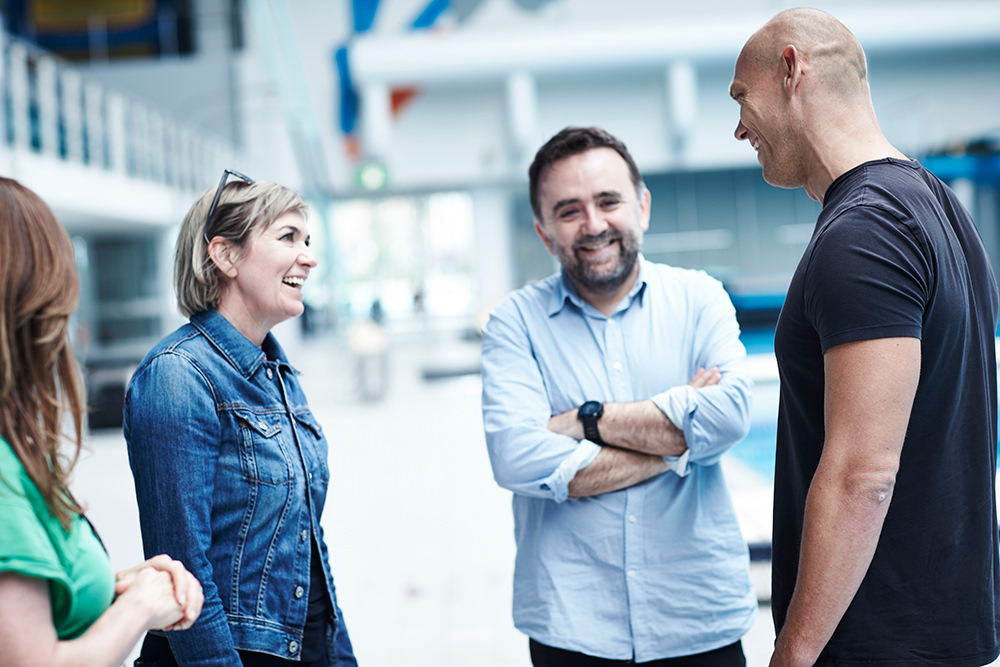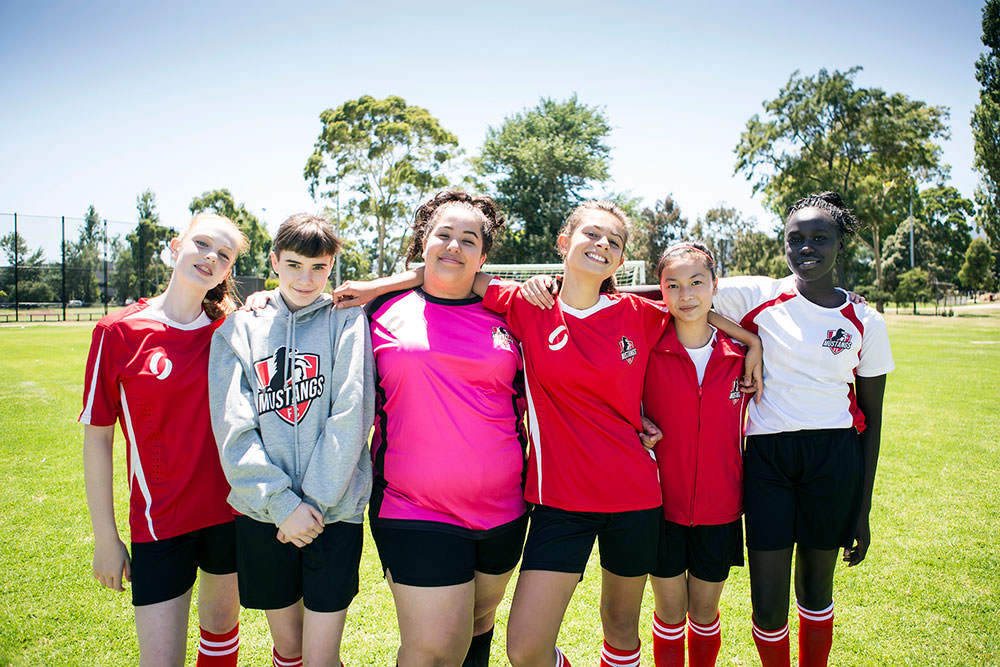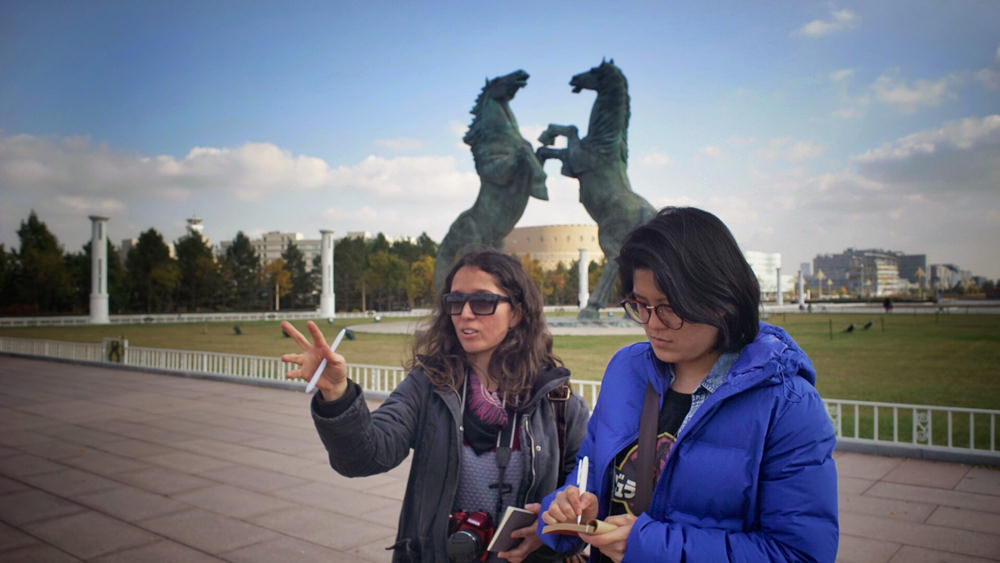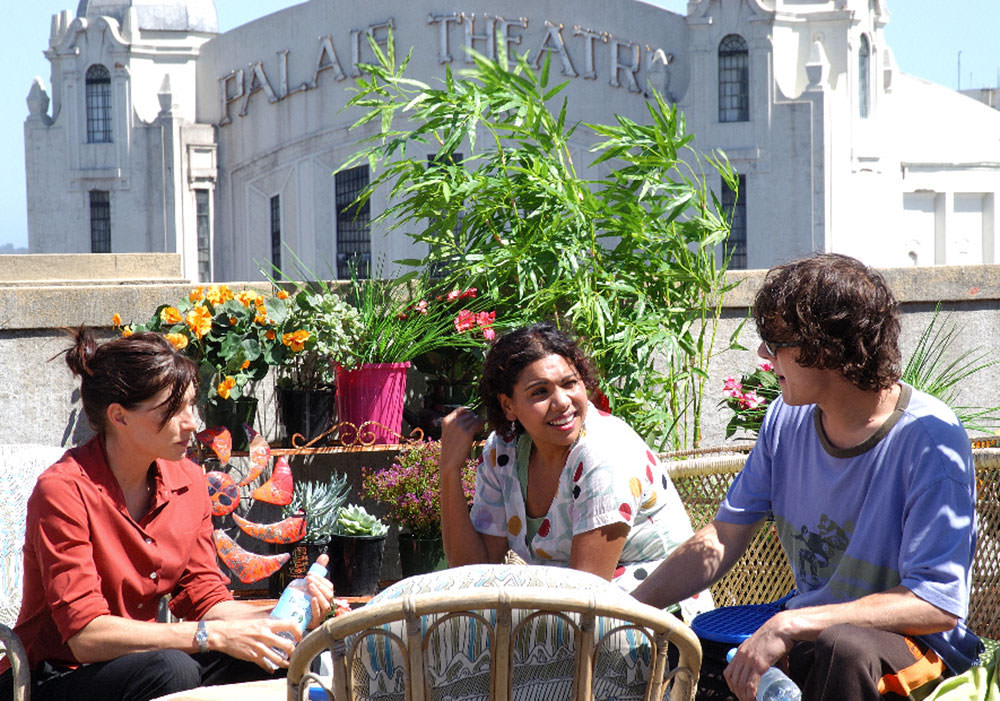Amanda Higgs: championing Aussie TV
Seven Types of Ambiguity producer Amanda Higgs talks about switching between suspenseful adaptations to children’s sports series and why The Secret Life of Us had such impact.
 Amanda Higgs with director Robert Connolly and Olympian Michael Kilm on the set of Barracuda
Amanda Higgs with director Robert Connolly and Olympian Michael Kilm on the set of Barracuda
From The Secret Life of Us to Seven Types of Ambiguity, producer Amanda Higgs is a champion of Australian television, shepherding her own original concepts to the screen alongside captivating dramas.
When we catch up with Higgs, she is in the final weeks of filming a new 13×30 minute series she co-created for ABC ME called Mustangs FC, about a group of teenage girls who start their football club’s first all-girl team.
At the same time, psychological drama Seven Types of Ambiguity – which was filmed in Melbourne last year – is about to hit screens. Based on Elliot Perlman’s novel of the same name, it stars Hugo Weaving and Xavier Samuel, and will be airing on ABCTV and iview from 13 April.
And prior to that she was producing adaptation Barracuda. To say Higgs has been busy seems an understatement.
And while adapting Perlman’s “beautiful, complex novel” for the screen proved a challenge and took some years, the reverse was the case for Mustangs FC, which came together really quickly – and is far lighter in tone.
“It was really about timing,” she says.
Higgs says she and co-producer Rachel Davis both wanted to create something for young girls at a point in time when there had been (and still is) a focus on female-led content and young women.
“Everybody at the ABC who read that pitch for Mustangs, they just got it straight away. So the ABC were immediately excited, Matchbox Pictures were excited, NBCU were excited. It just happens sometimes that you absolutely get in at the right moment for people to become your champions.”
Higgs and Davis also felt that Mustangs FC should be driven by women in front and behind the camera.
“If we’re making a show about putting young women at the centre of it, it was important that a lot more women were taking the lead in every department (and) that the majority of directors be female,” Higgs said.
 Mustangs FC
Mustangs FC
Three of the directors are female – Fiona Banks, Corrie Chen and Tori Garrett – and they’re joined by veteran TV director Roger Hodgman (who Higgs last worked with on The Secret Life of Us).
For Chen, it marks her TV directing debut and Higgs says they were keen to give her the opportunity to make this leap.
“Corrie came to us recommended by a number of people – people who had given her attachments, who knew of her through other shows she had been attached to, and who spoke very well of her, above and beyond the work that she’d done in her short films,” she says.
Chen is also a recipient of Gender Matters: Brilliant Stories, which supported the development of her first feature film Strangers, and she was actually in the midst of that when Higgs got in contact.
“We first spoke to her when she was actually overseas in China on a research trip for Gender Matters. We had these two weird Skype conversations where it was dropping in and out (of reception), but there were a lot of things about Corrie’s life and growing up that just felt like the right fit for this show,” Higgs says.
“And as much as anything it’s about enthusiasm for the material. You want the director to feel connected to the material and understand what we’re doing and why we’re doing it, because it’s a children’s show and the budget isn’t that of an adult drama, so there are compromises that directors have to make at this budget level. It was really great timing and actually it couldn’t have turned out better.”
This difference in budget is something that Higgs finds somewhat baffling, considering how well Australian children’s series – from Dance Academy to Nowhere Boys – are received both here and abroad.
“It’s a curious one. Why is that so? They not only sell, they’re incredibly popular, they win awards, they’re critically acclaimed, they’re really successful,” she says.
 Strangers writer Penelope Chai and writer/director Corrie Chen
Strangers writer Penelope Chai and writer/director Corrie Chen
For Higgs, like Chen, she got her foot into the industry because of female mentors as well – producers Jan Chapman and Sandra Levy.
“I did an attachment on The Last Days of Chez Nous when I was at film school at AFTRS in Sydney,” she says.
She wrote to a number of producers she was keen to work with after she finished film school and got an interview with Levy.
“And because Jan and Sandra have a relationship, Jan was able to be my referee and endorse me when I went for that interview,” she said.
“Both of those people were very instrumental as role models for me, for being producers that are truly creative, who engage in development, in finding their own projects, in being enormously script and story literate, and being in their own way, true powerhouses of their own businesses. And then when I went to work with Sandra she was obviously in partnership with John Edwards so that was another huge step in my career when he and I did The Secret Life of Us.”
The Secret Life of Us was a seminal Australian television series that still holds a place in the minds of many Australians who tuned in during the early 2000s.
As for its lasting impact, Higgs puts it down to the fact that they made a series for a gap in the market that wasn’t being catered for.
“There were no shows at that time on Australian television that were speaking to 20 to 30 somethings,” she said.
“I just felt like there must be a way that we can make a drama for this age group that doesn’t have a water chase, or a murder or a legal case…
“The Secret Life of Us was really speaking to what I was going through in life at the time, like the work-life-home balance, or as we used to call it ‘the trifecta’.”
 The Secret Life of Us
The Secret Life of Us
The Secret Life of Us ran from 2001 to 2005 on Network Ten, with 22 episodes a season (except for season 4, which was 20 episodes).
“I couldn’t even imagine doing 22 hours a year right now,” Higgs says. “And it was really quite low budget, but it doesn’t look it.”
As the 2015/16 Screen Australia Drama Report showed, it is unlikely that Higgs will be doing another 22-hour season anytime soon. The trend toward shorter length, high-cost TV dramas continued with a large number of short-run shows (mini-series) such as Barracuda, Deep Water and The Secret Daughter, but zero long-form series (comprising 20 or more episodes). This is with the exception of ongoing serials Home and Away and Neighbours.
But Higgs is delighted at the renaissance television continues to undergo.
“I always wanted to work in TV. But I remember someone saying to me way, way early on, before I made Secret Life, that I should get out of television because it was ‘defining’ me,” she says.
“I was quite shocked by that. I thought ‘I’m here to make TV. This is my passion. This is what I love’.
“TV gives you an opportunity to learn your craft every single day. I’ve probably produced about 100 hours of drama. I’ve learnt so much from that amount of producing, developing, post-producing, putting shows to air and I hope that with every show I make I get better at that process.
“Also you look at the quality of television on the world stage now. It’s remarkable. I watch a lot of TV, not only because I’m in the industry but because I love it, and I can hardly keep up.”
Seven Types of Ambiguity airs on ABC TV at 8.30pm from Thursday, April 13.

What to read next
How the team behind The Warriors adapted their idea and format to reel in a different demographic.
07 Apr 2017
Caris Bizzaca